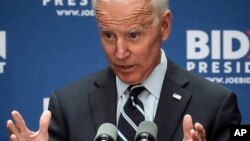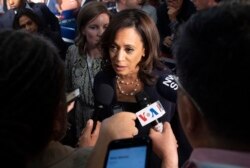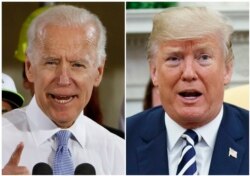Looking to steady his presidential campaign after a debate performance against other Democratic contenders that hurt him in public opinion polls, Joe Biden on Thursday blasted U.S. President Donald Trump's foreign policy as erratic and extreme.
In his most extensive remarks to date on foreign affairs, the former vice president said Trump had damaged America's "reputation and our place in the world, and I quite frankly believe our ability to lead the world."
The Republican president has unsettled Washington's allies by withdrawing the United States from the Paris climate accord, a nuclear deal with Iran and a trans-Pacific trade agreement, and has also threatened to leave the North Atlantic Treaty
Organization.
For Biden, who served in the U.S. Senate for 35 years, it was a much-needed return to firmer ground after weeks of having to defend his civil rights record, while allowing him to train his attention on Trump rather than other Democrats.
Kamala Harris, a black U.S. senator from California, assailed Biden, 76, in last month's debate over his past stance on the use of busing to integrate schools and for remarks about his willingness to work with segregationists while in the Senate more than 40 years ago.
Biden apologized for those remarks, but he has seen some erosion in support from Democratic voters, with Harris largely reaping the benefit and the field tightening in general among those vying to win the party's nomination to run against Trump.
Argument for collective action
In his address at the Graduate Center at the City University of New York, Biden criticized Trump for abdicating the United States’ leadership role in the world, and he argued that collective action was necessary to confront threats posed by climate change, nuclear proliferation terrorism and cyberwarfare.
As president, Biden said he would pull most U.S. troops out of Afghanistan, end U.S support for Saudi Arabia's military intervention in Yemen and reaffirm the nation's commitment to NATO.
Domestically, he said he would terminate Trump's travel ban against people from Muslim-majority countries and end the practice of separating migrant families at the U.S. border with Mexico.
Biden has sharply criticized Trump for walking away from the 2015 international nuclear deal with Iran, which Biden would reinstate should Tehran comply with its provisions.
Biden said that as president he also would have the U.S. rejoin the Paris climate accord and would convene a global summit on climate change.
Biden said he also would push for more ironclad commitments from North Korea to abandon its nuclear program than Trump has so far demanded.
For his part, Trump has not held back from criticism of the Obama administration’s foreign policy record. Trump has contended, among other things, that the Iran deal was too lenient and that Obama and Biden did not do enough to contain China's economic aggression.
Ahead of Biden's speech, the Republican National Committee and a pro-Trump super PAC released lengthy critiques of Biden's judgment on foreign affairs, pointing out that, among other things, Biden advised Obama to not go forward with the 2012 raid
that killed Osama bin Laden.
Not yet a target
Biden's record has not yet been a front-burner issue among his rivals for the Democratic nomination, but his vote in favor of the invasion of Iraq while in the Senate has been denounced by U.S. Sen. Bernie Sanders of Vermont and others.
At a campaign rally in Pennsylvania in May, Trump defended his "America First" policies, telling his supporters that Biden "said that he’s running to quote ‘˜save the world.' ... Well, he wants to save every country but ours."







